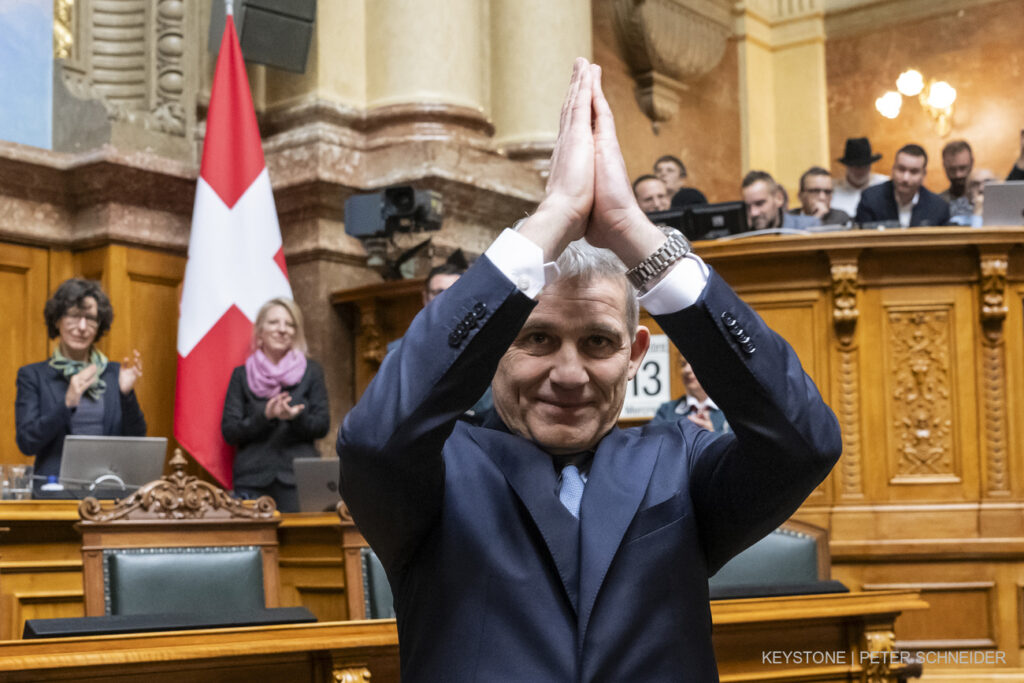Mié, Dic 13th 2023
Green Party again loses bid for a seat; Viola Amherd to take the Presidency
Keystone-SDA – The big surprise has failed to materialize. Beat Jans, the President of the Basel cantonal government, won the race to succeed Alain Berset as the candidate who was considered by many to be the favorite in the run-up to the election. In the meantime, the result of Daniel Jositsch, a member of the Council of States from Zurich, created a little suspense.
After the third round of voting, it was clear: Beat Jans is the new Federal Councillor. The Social Democrat from the canton of Basel-Stadt received 134 out of 245 valid votes. Jositsch received 68 votes and the Graubünden National Councillor Jon Pult 43 votes.

Jositsch had already come second in the first two rounds of voting – and with 63 and 70 votes respectively, received more support than last year in the race to succeed Federal Councillor Simonetta Sommaruga. As in 2022, Jositsch was not on the Social Democratic ticket this time either – and, as then, he made no declaration that he would relinquish the office if elected.
Pult, the SP’s second official candidate, was never able to pose a serious threat to the eventual winner, Jans, with votes of 49, 54 and 43 in the three rounds of voting.
Representatives of the SP expressed their anger at the large number of votes for Jositsch: Valérie Piller-Carrard, National Councillor for Fribourg, told RTS television in French-speaking Switzerland that there was a complete lack of respect for the candidates put forward by the party. In an interview with RTS, SP co-leader Samuel Bendahan (VD) called for it to be clarified whether the conservative camp still wanted social democrats in the government.
Jans is the first member of the Federal Council from Basel City in fifty years. The last time a politician from the canton of Basel-Stadt was elected to the federal government was Hans-Peter Tschudi in 1959. In his first speech after his election, Jans emphasized the importance of compromise. Only in this way could the current challenges be overcome. Switzerland is a country of strong communities. The people of Switzerland had agreed to move forward together across cultural and linguistic boundaries and to draw strength from diversity: “We should build on this.”
Prior to the decision on Berset’s successor, the six current members of the Federal Council stood for re-election. There were no surprises here. The Greens’ attack on the seat of Foreign Minister Ignazio Cassis clearly failed. The liberal magistrate was re-elected in the first round of voting – with 167 out of 239 valid votes. His challenger, the Green National Councillor Gerhard Andrey from Fribourg, only received 59 votes.
Only a minority of the SP parliamentary group supported Andrey’s candidacy, the SP parliamentary group announced shortly before the Federal Council election. The fact that Berset’s seat was only allocated at the end may have played a role in this – which opened up the possibility of a tit-for-tat against the SP.
Following the failure of their attack on the second FDP seat, the Greens are sticking to their claim to representation in the Federal Council. Parliament had failed to include all important political forces in the government, they wrote in a press release. They accused the Federal Council parties of clinging to their seats.
The FDP, on the other hand, welcomed the re-election of Cassis and Finance Minister Karin Keller-Sutter as a commitment by Parliament to the stability of the institutions. The magic formula and the principle of not voting out incumbent members of the Federal Council are Switzerland’s strengths.
In addition to Cassis, the other current members of the Federal Council were also re-elected at the first attempt. The best result was achieved by Economics Minister Guy Parmelin (SVP) with 215 votes. Justice Minister Elisabeth Baume-Schneider (SP) came last with 151 votes.
Viola Amherd’s election as President of the Swiss Confederation was also uncontroversial, even though her result of 158 votes was below average in a long-term comparison. Karin Keller-Sutter was elected Vice President. She is likely to take over the presidency of the Swiss Confederation in 2025.
The Green Liberals scored a success on Wednesday. For the first time, they have been appointed Federal Chancellor. GLP candidate Viktor Rossi won the race to succeed Walter Thurnherr (center) against SVP members Gabriel Lüchinger and Nathalie Goumaz as well as Lukas Gresch-Brunner, who is independent of the party.
Según Swissinfo, Jans’ election is “proof that the social mobility still exists in Switzerland.” Quoting the article:
“I never thought I would one day be a candidate for the Federal Council”, Beat Jans said with emotion after being launched in the government race by his party. Today, this son of a working-class family has ascended to the highest office. Born in Basel in 1964, he grew up with a mother who was a shop assistant and a father who was a locksmith. He began his working life with an apprenticeship as a farmer, before training as an agricultural technician and then studying environmental sciences at the Swiss Federal Institute of Technology (ETH) in Zurich.
From humble beginnings to top of the heap. Proof that Switzerland remains an egalitarian society with opportunities for all.
©Keystone/SDA
